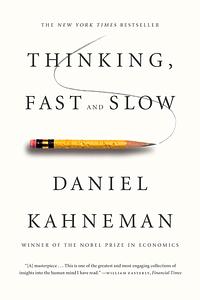You need to sign in or sign up before continuing.
Take a photo of a barcode or cover
I'm now going to second guess every single decision I make
This is now accepted research, but in context it’s a tremendous body of work.
informative
slow-paced
It was interesting to listen to a prompt, knowing that I would probably intuitively answer it wrong and watch myself make logical fallacies in real time despite expecting it. Overall, I got some new perspectives on why we make the choices we do. It's a little scary how we think we are in control much more than we are. My favorite part was in the last ~third of the book, where it started tying system one and system two back to how we can try to make better decisions that lead to higher satisfaction and perceived happiness in our lives.
This book turns out to be a near-comprehensive primer on all the latest in behavioral psychology. The tack the author (Nobel laureate Daniel Kahneman) takes is to first describe two "systems" of thinking--the instinctual, immediate-response analysis of System 1 and the slow, manual, effortful agent System 2. Then, Kahneman lays out various ways and whys regarding how System 1 jumps to conclusions that aren't at all what System 2 would come to given time and thought. It's good to have an awesome instinct--but sometimes the instinct can lead to suboptimal choices or beliefs.
I wish the book were lighter and more approachable, but basically it just isn't. It's a bit dry (the producers of the audiobook could have picked a less professorial narrator, too), and though the material isn't challenging in a technical sense, it does require a lot of attention. Many of the concepts by their nature are unintuitive--that's the entire point the book is illustrating. And the author's attempt to couch the material as "trying to bring terms into common parlance, water cooler talk," falls somewhat flat.
That is the goal here, though--to make complex concepts more approachable by defining them with simple terms that can be introduced into the vocabulary. It's a noble goal, and I think as time goes by terms like "planning fallacy" and "risk seeking with respect to gains" will filter more and more into the mainstream. If you want to help with that, and want to learn a great deal about how the human mind works, check this book out. Then talk about it with your friends and co-workers!
I wish the book were lighter and more approachable, but basically it just isn't. It's a bit dry (the producers of the audiobook could have picked a less professorial narrator, too), and though the material isn't challenging in a technical sense, it does require a lot of attention. Many of the concepts by their nature are unintuitive--that's the entire point the book is illustrating. And the author's attempt to couch the material as "trying to bring terms into common parlance, water cooler talk," falls somewhat flat.
That is the goal here, though--to make complex concepts more approachable by defining them with simple terms that can be introduced into the vocabulary. It's a noble goal, and I think as time goes by terms like "planning fallacy" and "risk seeking with respect to gains" will filter more and more into the mainstream. If you want to help with that, and want to learn a great deal about how the human mind works, check this book out. Then talk about it with your friends and co-workers!
informative
As an Autistic person, this book was frustrating to read and difficult to relate to. It did shed some light on how neurotypical brains work, but the constant "your brain just did X" or "you surely thought Y" made it very hard to read. I spent most of the time going "No, my brain did NOT just do X - why would it? That isn't what was actually said". I spend all day being frustrated by this sort of thing; I don't need to do it while relaxing, too.
informative
medium-paced
informative
reflective
medium-paced
informative
reflective
slow-paced


